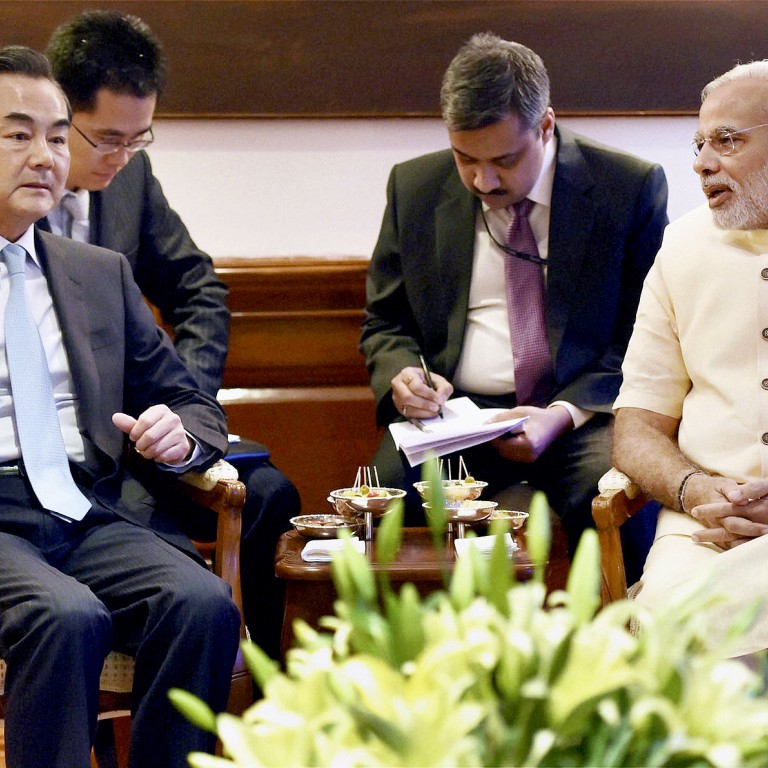
Indian PM Modi praised for rebuffing China’s power play on Brics development bank
Differences over technical issues are still being ironed out, deputy foreign minister says following Indian reports of China's 'bullying'
Indian Prime Minister Narendra Modi was praised by leading Indian newspapers for standing up to China amid negotiations over the establishment of a multinational development bank, which could turn into the “next India-China flashpoint”.
The world’s two most populous nations along with Brazil, Russia and South Africa – dubbed the “Brics” countries – are in their last week of negotiations prior to a widely expected announcement of a new development bank.
Indian media reported that the negotiation process had thwarted an alleged attempt by China to “dominate” the new lending institution by infusing more cash in it than suggested by India.
The “Brics” bank is being set up to counter perceived excessive American influence on existing international and regional lending institutions such as the World Bank and Asian Development Bank. Brics countries have in the past called for a reform of the international lending system.
Next week, the heads of state of these five largest fast-growing emerging markets are scheduled to meet in Fortaleza, in northeastern Brazil, to announce the establishment of their alternative lender at the first multilateral meeting attended by India’s freshly minted prime minister.
Another contentious issue is the bank’s initial capital and its distribution among the five founding members. The bank’s initial capital is widely expected to reach US$50 billion, with each Brics country contributing US$10 billion.
One compromise could be equal shares of capital for all the founding members, and thus equal votes, but then have trust funds, where some countries contribute more, argued Stephany Griffith-Jones, an economist at the Initiative for Policy Dialogue at Columbia University. "I do not think these discussions are evidence the Brics bank lending decisions will be politicized," she wrote in an email. "We should let it start working, before we can evaluate."
The future seat of the bank’s headquarters has also not been decided yet and remains a contentious issue, Indian papers reported.
Sujata Mehta, India’s secretary in charge of economic relations at its External Affairs Ministry, told the Calcutta Telegraph that negotiations on the headquarters would continue this week.
New Delhi, Shanghai, Johannesburg and Moscow are competing to host it, but Shanghai, the financial hub of the world’s second-largest economy, is the widely favoured candidate.
A third issue yet to be tackled is the new bank’s first president. Unlike the World Bank and International Monetary Fund, where presidents are traditionally Europeans or Americans, the new Brics bank will have a rotating presidency among the five founding members. Modi’s government has already voiced its preference for a first Indian president, according to The Indian Express.
Six weeks into his administration, Modi has made overtures about improving ties with China. India’s army chief, General Bikram Singh, returned to India from China over the weekend, ending the first visit of India’s top soldier to the neighbouring power in nine years.
Vice-president Hamid Ansari also met President Xi Jinping on a visit to Beijing last week.
In the run-up to the summit in Brazil, which will include a first meeting between Xi and Modi, Indian media have already called on the Hindu nationalist premier to stand up to the neighbouring economic powerhouse.
The Times of India conluded: “Modi’s diplomatic skills in preserving India’s interests will … be tested as Xi attempts to turn Brics into a platform from which to advance China’s global agenda.”
The press departments of India’s ministriy of foreign affairs were not available for immediate comment.
Speaking at a press briefing on President Xi Jinping's trip to Brazil, Vice Minister of Foreign Affairs Li Baodong said discussions are still "ongoing in an intensive manner". Li said he was confident that consensus on remaining "technical issues" could be reached before the summit.
The ministry's press office issued a similar statement shortly after Li made his comments.


